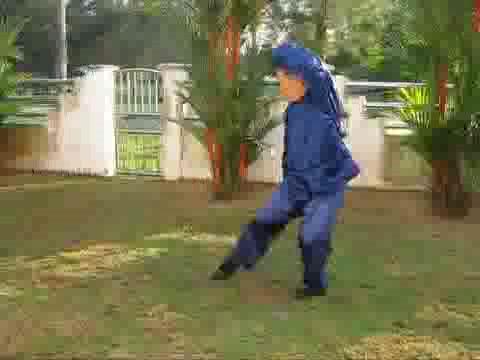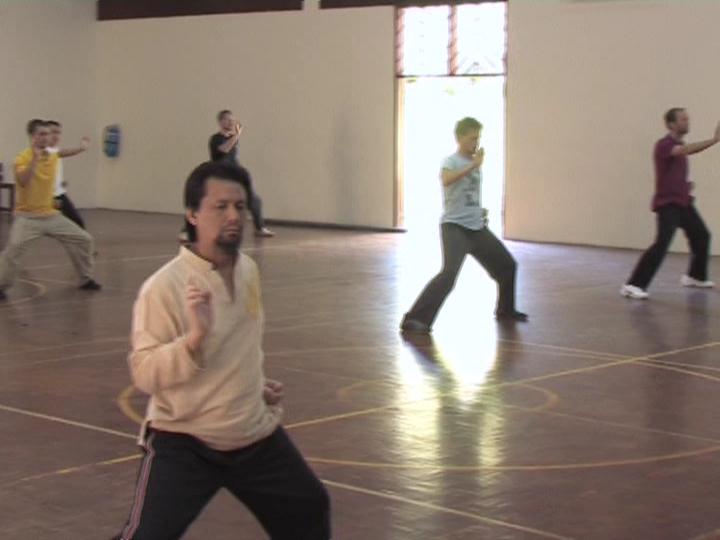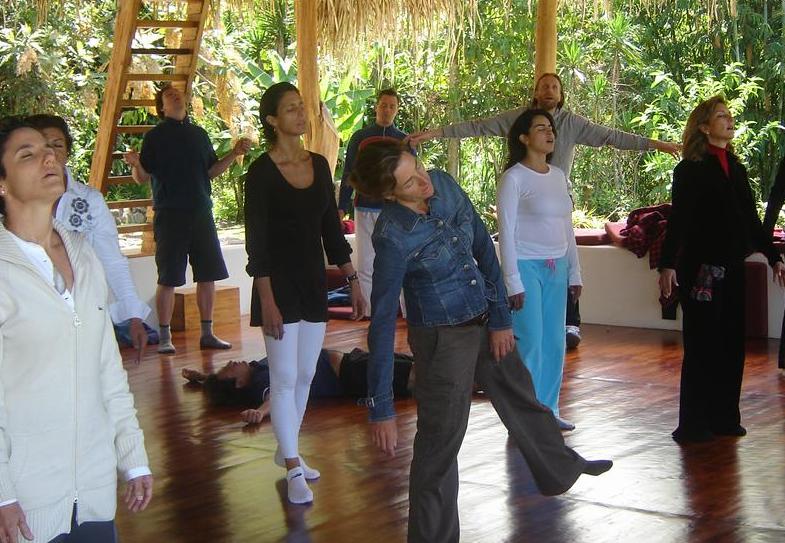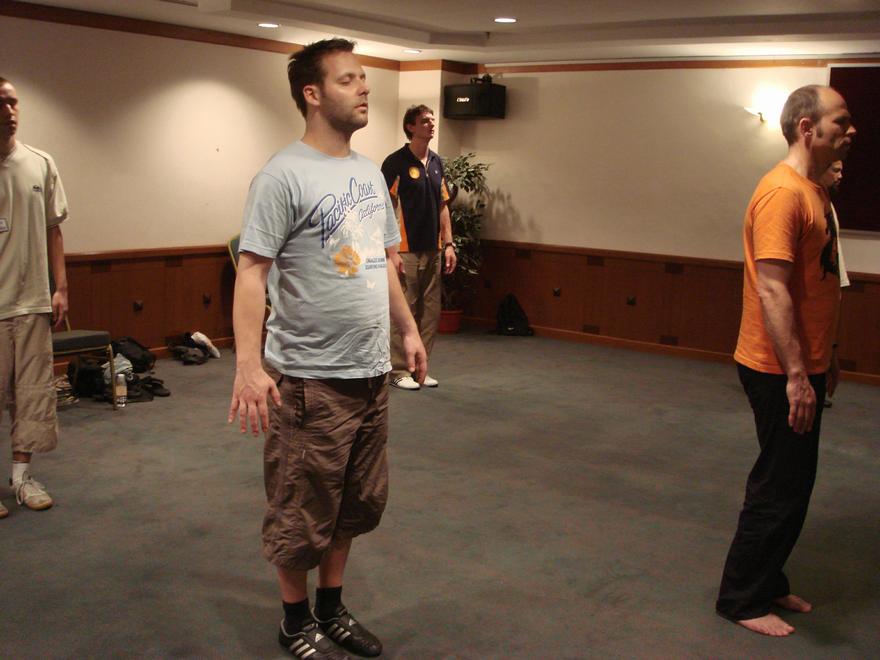SELECTION OF QUESTIONS AND ANSWERS
JULY 2012 PART 1

"Dark Dragon Wraps Body" in Wudang Taijiquan
Question 1
I find the internal force developed from Wudang Taijiquan and from Iron-Wire very different. Can you please elaborate in this?
— Sifu Eugene Siterman, USA
Answer
Yes, they are very different. Both are internal force, but one is soft and the other hard. They represent both extremes in the spectrum of force development.
The force from Wudang Taijiquan is soft and flowing. One feels graceful and agile.
The force from Iron-Wire is hard and consolidated. One feels powerful and solid.
These terms are relative and used provisionally. When we say that Wudang Taijiquan is soft, we do not mean it is not forceful. In fact soft force is often more forceful than hard force. If one is puzzled, a good analogy is that the power of an electric current, which is soft, is more powerful than that of a sledge-hammer.
On the other hand, when we say that Iron-Wire is consolidated, we do not mean that it is not flowing. As I have often said, terms used in the internal arts are provisional. These terms may not have the same meaning as in everyday situations.
In everyday meaning, when something is soft we normally think it is not powerful. When something is consolidated, it is not flowing. But in internal arts, we often have seemingly contradictory conditions at the same time. Wudang Taijiquan force and Iron-Wire force can be soft and hard, solid and flowing at the same time, but relatively Wudang Taijiqnan force is more soft and flowing than Iron-Wire force, whereas Iron-Wire force is more hard and solid than Wudang Taijiquan force. Such statements are baffling to the uninitiated, but interesting for us.
Question 2
Can we practice Iron-Wire and Wudang Taijiquan at the same time?
Answer
For most people, practicing Iron-Wire and Wudang Taijiquan at the same time would negate the results of both arts. Suppose a student practices only Iron-Wire, he gets 100 units of benefit. If he practices only Wudang Taijiquan, he also gets 100 units of benefit.
If he spends half the time practicing Iron-Wire and the other half practicing Wudang Taijiquan, will he get 50 units of benefit from Iron-Wire, and 50 units from Wudang Taijiquan? No, he will get only 35 units each, so that his total benefit is 70 units instead of 100 units had he practiced only one art. This is the main reason why masters advice their students to focus on one art at a time.
But this does not apply to us in Shaolin Wahnam. For us, if we practice Iron-Wire and Wudang Taijiquan we get more benefit than just practicing any one of them. For example, if a Shaolin Wahnam student practices only Iron-Wire, he gets 100 units of benefits. If he practices only Wudang Taijiquan, he also gets 100 units of benefit.
But if he sends half the time practicing Iron-Wire and the other half practicing Wudang Taijiquan, he will get not just 50 units of benefit, but 65 units of benefit for each art, making a total benefit of 130 units, not just 100 units had he practiced only one art.
Why is it that if other people practice Iron-Wire and Wudang Taijiquan, or any two opposing arts, at the same time, they get less benefit than practicing just any one of them, whereas for us in Shaolin Wahanm if we practice Iron-Wire and Wudang Taijiquan, or any two opposing arts, at the same time, we get more benefit than practicing just any one of them?
It is because for other people the two arts contradict each other and therefore the results are minimized, whereas for us the two arts complement each other and therefore the results are maximized.
To develop internal force in Iron-Wire training, a practitioner has to consolidate his chi, or energy. To develop internal force in Wudang Taijiquan, a practitioner has to let his chi flow.
If he focuses on just Iron-Wire or just Wudang Taijiquan, he can continue consolidating chi to develop internal force in Iron-Wire, or he can continue letting his chi flow to develop internal force in Wudang Taijiquan. However, if he practices Iron-Wire and Wudang Taijiquan at the same time, the processes of consolidating chi and of letting chi flow will contradict each other, reducing his benefit.
For us the case is different. It is because we have the magical skill of transforming chi flow into consolidating chi, and vice versa. Hence, when we practice Iron-Wire, we consolidate our chi. But we can also let this consolidated chi to flow if we wish.
So when we change to practicing Wudang Taijiquan, we do not start from stretch because we already have the consolidated chi developed earlier in Iron-Wire training. We can convert this consolidated chi to flowing chi. Similarly when we change to practicing Iron-Wire again, we can convert the flowing chi developed earlier in Wudang Taijiquan to consolidated chi.
An analogy may make this clear. If a worker spends some of his income, he has less money to save in his bank. If he saves more money in his bank, he has less money to spend.
For an entrepreneur the case is different. He can use some of his savings to generate more income so that he has more money to spend. As he has more income he can also increase his saving.
For an entrepreneur, both his saving and his expenditure grow because he can convert one to another. The more he saves, the more he can spend. The more he spends, i.e. uses his cash flow, the bigger will be his bank account.
A worker can't do this because his income is fixed. The more he saves, the less he spends, and vice versa.
For us, both our consolidated chi and flowing chi grow because we can convert one to another. The more we consolidate our chi, the more is our flowing chi. The more our chi flows, the more we can consolidate our chi.
Other people cannot do this. The more they consolidate their chi, the less is their chi flow. The more their chi flows, the less is their consolidated chi.
The analogy becomes clearer if we quantify our examples. If a worker has 500 euros in his bank and uses 200 of it, the balance in his account is 300. The next month when he saves another 500, his total is 800 euros.
If an entrepreneur has 500 euros in his bank, and uses 200 to generate more income, this 200 becomes 300 which he can put back in his bank, making the balance of 600. The next month when he saves another 500, his total is 1100 euros.
If other people have consolidated 500 units of energy in their Iron-Wire training, and then use 200 units of it in Wudang Taijiquan, their balance is 300 units of energy. This is evident in their becoming tired after the training. In the next training session when they consolidate another 500 units of energy from Iron-Wire, their total energy is 800 unites, not 1000 unites. Hence, they minimize their result if they practice Iron-Wire and Wudang Taijiquan at the same time.
If we have consolidated 500 units of energy in our Iron-Wire training, and then uses 200 units of it in Wudang Taijiquan, our total amount is still 500 units, not 300 units because our energy flows, not drained away. This is evident in our not becoming tired in our training.
Meanwhile the 200 units of flowing energy in Wudang Taijiquan training becomes 300 units, with an increas of 100 units, because we can generate more energy with it. When we convert this 300 units into consolidated energy and add it to the original 300 units, it becomes 600 units of consolidated energy. This is evident in us becoming more energetic after the training. In the next training session when we consolidate another 500 units of energy from Iron-Wire, our total energy is 1100 units, not 1000 units. Hence, we maximize our result when we practice Iron-Wire and Wudang Taijiquan at the same time.

One-Finger Shooting Zen is excellent for developing not only internal force but also mental clarity
Question 3
Can you please tell us more about the difference between one who trains Iron-Wire followed by chi flow, and another who trains Iron-Wire but has no chi flow?
Answer
The one who trains Iron-Wire with chi flow will have more internal force as well as more benefits than the one who trains Iron-Wire without chi flow.
He has more internal force because his chi flow activates more energy form the Cosmos to flow into him during his chi flow. This is why we feel energized after a chi flow session.
However, at the beginning, his arms will be less powerful than the arms of the one without chi flow, because some of the energy in his arms flows into his body to nourish his internal organs, making him healthier and giving him more vitality. Eventually he will be more powerful -- in his arms and elsewhere -- than the one without chi flow because he can channel his extra energy to his arms or to wherever he wants.
Both of them practice Iron-Wire correctly. They practice Iron-Wire as chi kung, or energy exercise. The difference is that one has chi flow and the other does not have chi flow.
It is interesting to compare them with a third student who practices Iron-Wire wrongly as isometric exercise, which is physical exercise. This, unfortunately, is the norm today.
This third student will have big muscles but his training does not make him healthier or give him vitality and longevity as the energy he has developed is locked in his muscles.
At the beginning the arms of the student who performs isometric exercise will be most powerful, followed by the student without chi flow, and then the student with chi flow.
But eventually the results are reversed. The student with chi flow will be most powerful as well as the best in health, vitality and longevity, followed by the student without chi flow, and then the student who performs isometric exercise.
Question 4
Sifu, you can see things very clearly in kungfu as well as in life? Can you please tell us how you develop this wonderful ability? Can we develop this ability too?
Answer
Thank you for your compliments. This is because of my mental clarity and mental strength.
Mental clarity and mental strength are closely related, but not the same. One who has mental strength usually has mental clarity too, and vice versa.
But this may not always be the case. It is also possible that one has mental clarity but not mental strength, like he may see things clearly but he becomes mentally tired easily. It is also possible that one has mental strength but not mental clarity, like he may be able to perform mental work for a long time but does not see things clearly.
My mental clarity and mental strength that enable me to see things clearly and to work intellectually for a long time without mental fatigue is due to my Shaolin, Taijiquan and chi kung training.
Whenever I practice Shaolin Kungfu, Taijiquan and chi kung, I clear my mind of all thoughts, i.e. my mind is clear. This is training for mental clarity.
A lot of Shaolin, Taijiquan and chi kung exercises strengthen the mind. For example, when I practice One-Finger Shooting Zen, I focus my mind on my index finger, thereby developing a one-pointed mind which makes the mind strong. When I practice Cosmic Shower, I let cosmic energy nourish my mind and strengthen it.
Of course you can develop this wonderful ability. I teach what I practice, and practice what I teach. By practicing what I teach, you will have mental strength and mental clarity. Indeed, having mental strength and mental clarity is a noticeable benefits all our Shaolin Wahnam students have. This is readily evident when one reads our Discussion Forum.

Chi flow is the essence of chi kung
Question 5
My wife and I have been practicing chi kung for 6 months. Can you tell which of the patterns presented in your excellent book would benefit me in treating my tinnitus (ears ringing).
— Pierre, France
Answer
In chi kung it is not what exercises you practice, but how you practice them that is important. In other words, the successful practice of chi kung depends more on skills than on techniques.
Many people do not know this important fact. This is one main reason why many people think they can learn chi kung successfully from books or videos. They may learn the techniques well, but they only practice the techniques as physical exercise as they lack the necessary chi kung skills. It is like many people practice Tai Chi Chuan, which is an internal martial art, as external Tai Chi dance.
More subtly, many people do not take the trouble to find good teachers. They mistakenly think that all chi kung teachers are the same. Most chi kung teachers teach only chi kung techniques; they do not teach skills.
In fact, many teachers themselves do not realize the difference between techniques and skills. Hence, students practice the techniques for a long time, usually years, and if they are lucky they develop the skills haphazardly and unknowingly.
This is the main reason why more than 80% if chi kung practitioners today have little or no chi kung benefits even when they have practiced for years. Although the techniques are genuine, they merely practice them as gentle physical exercise.
In our school, where students learn chi kung skills right at the beginning, any chi kung exercise may overcome your tinnitus or any health problem.
Understandably, it may not be easy for other people to understand what I am saying. They may find my statement ridiculous. Any chi kung exercise can overcome any health problem? Yes, if you practice it as genuine chi kung with chi kung skills. On the other hand, if you practice any exercise as physical exercise -- which is what you and most other people do, otherwise you would not have asked me the question -- it cannot overcome any health problem.
The explanation is actually straight-forward. All health problems are caused by energy blockage. Any chi kung exercise can generate an energy flow that can clear energy blockage.
Nevertheless, if all other things were equal, "Pushing Mountains" amd "Nourishing Kidneys" are very effective for overcoming tinnitus. Howver, in real life other things are not equal. For example, a master practicing any exercise will be more effective in overcoming tinnitus or any health problem than a student practicing "Pushing Mountains" or "Nourishing Kidneys".
Question 6
What is "song qua"? I have problems finding information about this. I am also interested to find out about chi kung for lighter body. I have problems with my knee. I ruptured some knee ligaments while practicing jumps and kicks.
— Andrea, Austria
Answer
"Song qua", which is in Mandarin, means loosen your hips. It is a common instruction Taiji teachers give to their students.
The art of lightness has to be learnt personally from a master. It is inadvisable for you to practice on your own.
"Rotating Knees" followed by chi flow is a good exercise to overcome knee injuries.

Senior disciples of Grandmaster Wong practicing the Big Universe
Question 7
If a person has attained the Big Universe, will he also attain the Golden Bell at the same time, or is the Golden Bell a specialized art which has to be practiced separately?
— Ricky, Malaysia
Answer
The Big Universe and the Golden Bell are separate arts. Thus, one who has attained the Big Universe may not necessarily attain the Golden Bell, and vice versa.
Nevertheless, these two arts are related. If one has attained the Big Universe, or even the Small Universe, attaining the Golden Bell is relatively easy.
On the other hand, the reverse may not be true, i.e. it may not be as easy for one with Golden Bell to attain the Small Universe or the Big Universe, though it is usually easier for him than for another person without Golden Bell.
There are many methods for Golden Bell training. One such method uses the Small Universe or the Big Universe as the base. Other methods use Abdominal Breathing, Reverse Breathing or Golden Bridge.
Question 8
I am currently practicing Tai Chi Chuan. I have noticed that some old Tai Chi masters are able to push back an opponent by just projecting their chi without even touching their opponent. How do they train to achieve such high-level skills?
Answer
There are a few different methods, but all of them involve the training of energy and mind, and must be personally taught by a competent teacher. Golden Bell and Big Universe are some of these methods.
While such a high-level ability is true, there are also unscrupulous people faking such demonstrations. These bogus demonstrators always use their own students, and it is not difficult for an initiated observer to note the fakery.
LINKS
Selected Reading
- Taijiquan Treatise of Zhang San Feng
- Making Sounds in Iron Wire
- Iron Wire and Golden Bridge
- Enjoying Nature, the Evening, Colours, the Wind, the Birds Singing
- A Very Special Course, a Very Special Master
